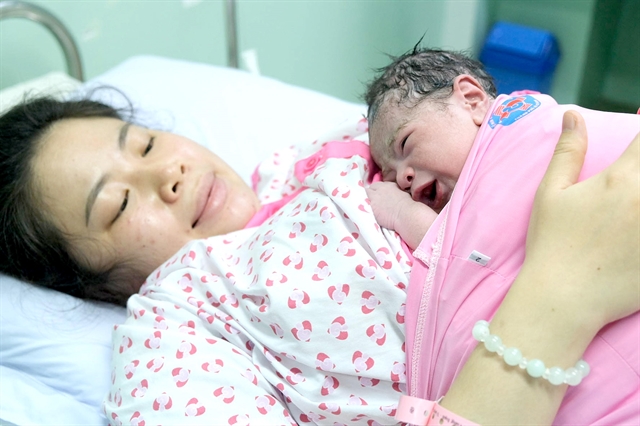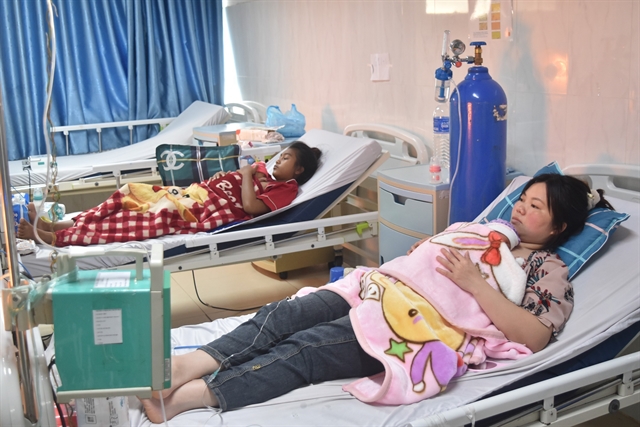 |
| A mother and her newborn at Hùng Vương Hospital in HCM City. — VNA/VNS Photo |
HÀ NỘI — Ensuring safe motherhood through improved care before, during and after pregnancy will not only reduce maternal and infant mortality rates but also lay a strong foundation for the health of Việt Nam’s future generations.
Safe motherhood is a key initiative in maternal and child health care, with the aim of improving medical care quality for new mothers and newborns to reduce obstetric complications and mortality rates.
Statistics from the Ministry of Health (MoH) from the first nine months of 2024 showed that more than 87.67 per cent of expecting mothers attended at least four prenatal check-ups during their pregnancy, and nearly 96 per cent of childbirths were assisted by skilled healthcare workers.
The rate of postnatal care during the first week after childbirth remains above 72 per cent.
Educating expecting and new mothers is seen as a key task, especially in the optimal care for children during their first 1,000 days of life.
These efforts require the engagement of the fathers and the families in providing material and emotional support during childbirth and postpartum care.
In addition to regular check-ups and pre-conception counselling, experts recommend that expecting mothers receive the necessary vaccinations to prevent tetanus in both the mother and child. Early detection of hepatitis B, syphilis and HIV can also help avoid perinatal disease transmission.
Mothers-to-be should also maintain a proper diet, with iron and folic acid supplementation for sufficient nutrition during pregnancy.
Nationwide, Việt Nam has been implementing a programme called 'Nutrition care during the first 1,000 days of life to prevent maternal and child malnutrition and improve Vietnamese stature' since 2019.
According to Dr Trần Thanh Dương, director of the National Institute of Nutrition, 1,000 days of life is a foundational period for a child’s physical and psychological development.
During this pivotal period, breastfeeding campaigns continue to be included in prenatal, perinatal and postnatal care, and are especially crucial for nutritional diets.
Breast milk banks have been providing care and treatment to thousands of newborns every year, primarily for low birth weight, preterm birth and other illnesses. These services also reduce the number of newborns requiring intensive care, thereby minimising infant mortality rates.
Việt Nam’s first-ever breast milk bank, at Đà Nẵng Hospital for Women and Children, has received nearly 12,800 litres of milk donated from 618 mothers, which have been provided to 35,570 newborns in its seven years of operation.
Meanwhile, the first breast milk bank in Việt Nam’s northern region, at Quảng Ninh Obstetrics and Paediatrics Hospital, has collected more than 5,400 litres of milk donated from 132 mothers since its establishment in May 2019.
Breast milk is collected, tested, pasteurised and stored from healthy mothers for infants who require additional nutrients.
On a larger scale, the MoH’s Maternal and Child Health Department has been implementing an initiative that guides obstetric and paediatric hospitals to provide support for breastfeeding, especially in early essential newborn care (EENC) and kangaroo mother care (KMC).
 |
| New mothers practice kangaroo mother care (skin-to-skin contact) with their preterm infants at the Central Highlands General Hospital. — VNA/VNS Photo Nguyên Dung |
While maternal and child health care has seen progress in recent years, experts believe that more specific policies and stable financial resources should be made available for reproductive health care, especially pre-conception screening and testing.
Engagement and close coordination between authorities, the community, and the family are also key factors in improving the quality of care for new mothers and their children, which not only reduce maternal and infant mortality but also contribute to the development of future generations. — VNS























